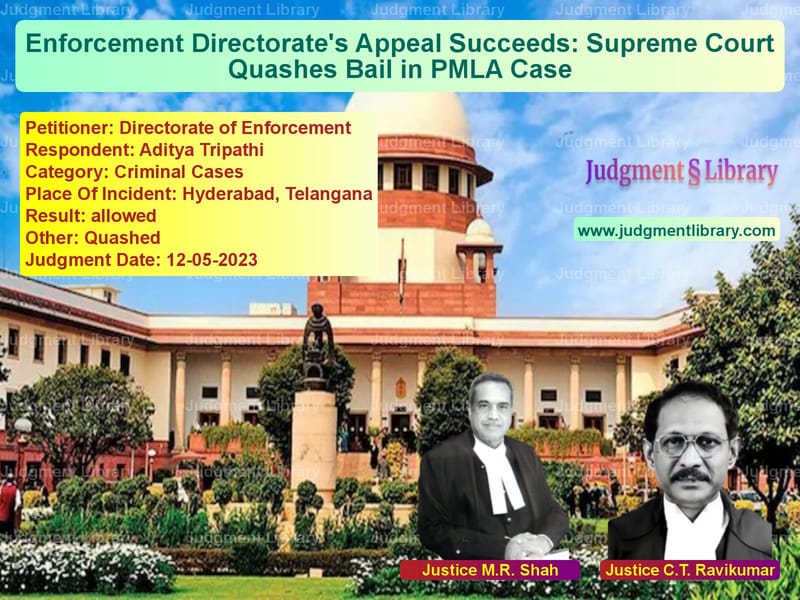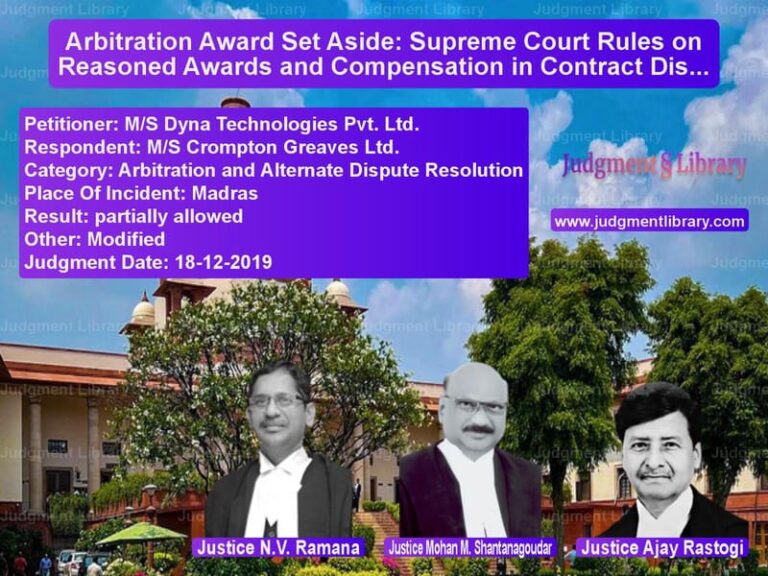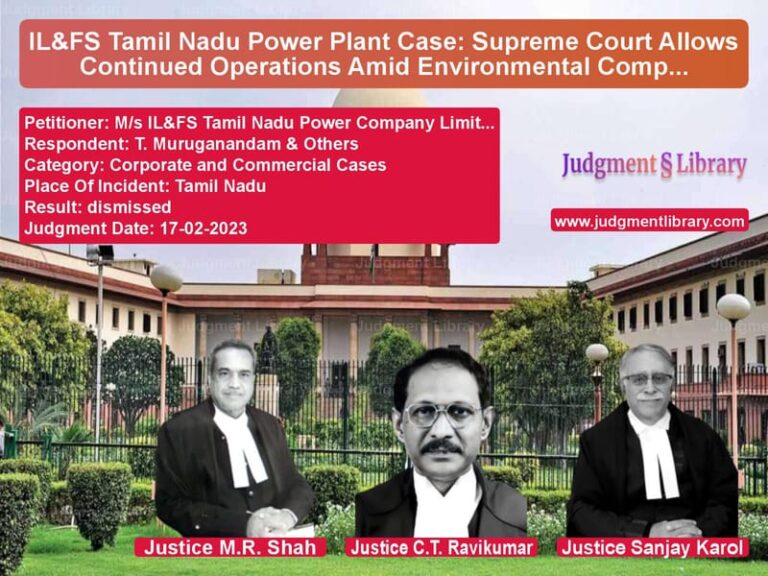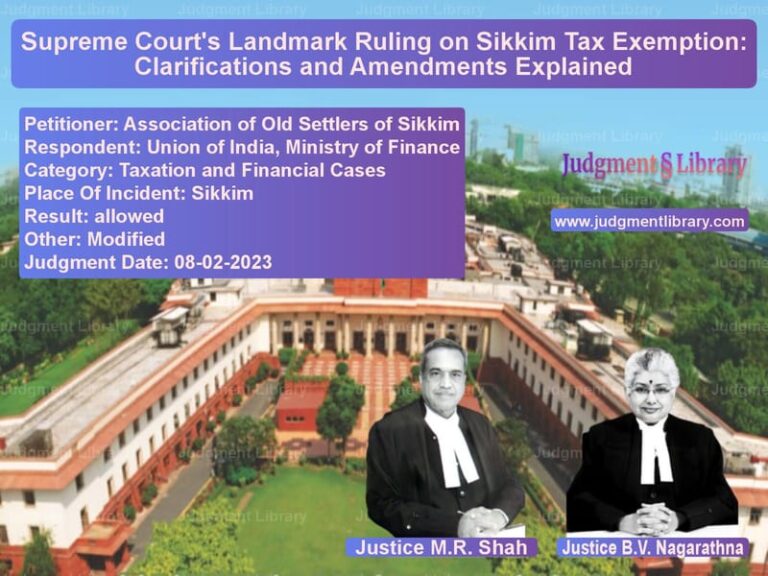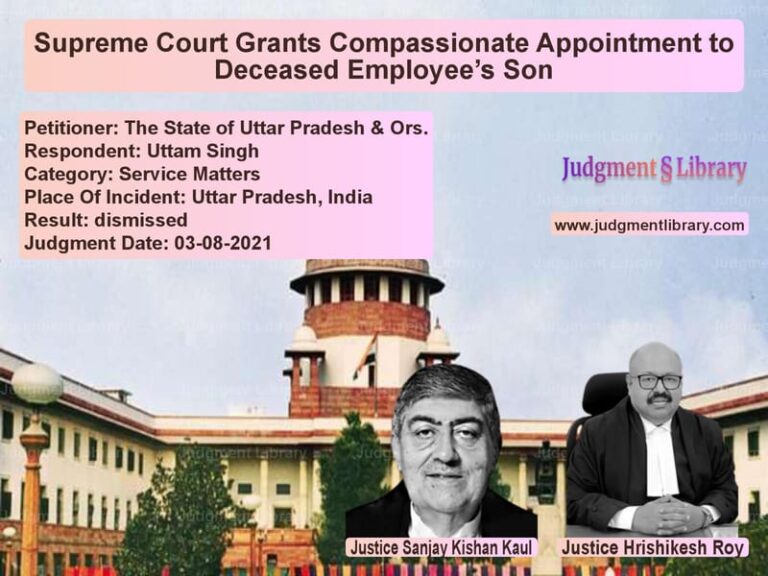Enforcement Directorate’s Appeal Succeeds: Supreme Court Quashes Bail in PMLA Case
The Supreme Court of India recently ruled in favor of the Directorate of Enforcement (ED), setting aside the bail granted by the Telangana High Court to individuals accused of money laundering under the Prevention of Money Laundering Act (PMLA), 2002. The case, which revolves around alleged tampering of e-tender processes in Madhya Pradesh’s Water Corporation projects, highlights the strict approach taken by the judiciary in money laundering investigations.
Background of the Case
The case began with FIR No. 12/2019, registered by the Economic Offences Wing (EOW), Bhopal, regarding alleged tampering of e-tenders for contracts worth ₹1,769 crore. The investigation revealed that certain companies, including M/s GVPR Engineers Limited, M/s Indian Hume Pipe Company Limited, and M/s IMC Project India Limited, manipulated bid prices to gain an unfair advantage.
The EOW filed a charge sheet on July 4, 2019, naming 20 individuals and entities under Sections 120-B, 420, 468, and 471 of the Indian Penal Code (IPC), along with relevant provisions of the Prevention of Corruption Act, 1988, and the Information Technology Act, 2000.
Upon reviewing the charge sheet, the Enforcement Directorate (ED) initiated a money laundering investigation under PMLA, as the scheduled offenses under IPC and the Prevention of Corruption Act triggered the applicability of the anti-money laundering law. The ED arrested the accused individuals on January 19, 2021.
Arguments Presented
Prosecution’s (Enforcement Directorate) Arguments
Additional Solicitor General (ASG) K.M. Nataraj, representing the Enforcement Directorate, made the following arguments:
- The Telangana High Court failed to properly apply Section 45 of the PMLA, which sets stringent conditions for bail in money laundering cases.
- The court ignored the serious nature of the offense and the broader implications of money laundering.
- The High Court granted bail merely on the ground that a charge sheet had been filed, without considering that the ED’s investigation was still ongoing.
- Releasing the accused could impede further investigation and allow them to tamper with evidence.
Respondents’ (Accused) Arguments
The defense, led by senior advocates Rakesh Khanna and Aman Lekhi, countered with the following points:
- The accused had been in custody since January 2021, and the charge sheet had already been filed, reducing the risk of evidence tampering.
- Other co-accused in the original FIR had been acquitted or discharged.
- The accused had been on bail since March 2021 without any allegations of misuse of their liberty.
- The High Court’s decision was sound and did not warrant interference from the Supreme Court.
Supreme Court’s Judgment
After carefully analyzing the case, the Supreme Court bench, comprising Justices M.R. Shah and C.T. Ravikumar, set aside the Telangana High Court’s order granting bail to the accused. The key observations of the Court were:
- “The High Court has not properly appreciated the seriousness of the offense under PMLA and has failed to consider the rigour of Section 45.”
- “Money laundering is a grave offense with wide-ranging economic and national security implications.”
- “The fact that a charge sheet has been filed does not imply that the investigation is over, particularly in PMLA cases.”
- “The investigation under PMLA is distinct from the original offense, and the High Court erred in treating them as the same.”
- “Granting bail in such cases without proper application of mind could weaken enforcement efforts against financial crimes.”
Impact and Implications
This ruling reinforces the stringent approach towards money laundering offenses under the PMLA. The judgment has significant implications for financial crime enforcement, ensuring that courts take into account the severity of money laundering cases before granting bail. Key takeaways include:
- Strict Scrutiny of Bail Applications: The judgment reaffirms that courts must strictly adhere to the conditions laid out under Section 45 of PMLA.
- Recognition of Economic Offenses as Serious Crimes: The Court acknowledged the damaging effects of financial crimes on economic stability and national security.
- Precedent for Future Cases: This ruling sets a precedent that high courts must carefully examine the nature of the offense and the stage of investigation before granting bail.
Conclusion
The Supreme Court’s decision in this case underscores the importance of a rigorous approach in tackling money laundering and financial fraud. By overturning the bail granted to the accused, the Court has signaled that financial crimes will not be taken lightly, and enforcement agencies must be given the necessary freedom to conduct thorough investigations without undue interference.
With money laundering cases increasingly becoming a focal point of legal and regulatory scrutiny, this ruling serves as a reminder of the judiciary’s role in ensuring that economic offenders do not escape the due process of law. The judgment stands as a landmark in reinforcing the robust framework of the Prevention of Money Laundering Act and its application in combating financial crimes.
Petitioner Name: Directorate of Enforcement.Respondent Name: Aditya Tripathi.Judgment By: Justice M.R. Shah, Justice C.T. Ravikumar.Place Of Incident: Hyderabad, Telangana.Judgment Date: 12-05-2023.
Don’t miss out on the full details! Download the complete judgment in PDF format below and gain valuable insights instantly!
Download Judgment: directorate-of-enfor-vs-aditya-tripathi-supreme-court-of-india-judgment-dated-12-05-2023.pdf
Directly Download Judgment: Directly download this Judgment
See all petitions in Money Laundering Cases
See all petitions in Fraud and Forgery
See all petitions in Bail and Anticipatory Bail
See all petitions in Corporate Compliance
See all petitions in Other Cases
See all petitions in Judgment by Mukeshkumar Rasikbhai Shah
See all petitions in Judgment by C.T. Ravikumar
See all petitions in allowed
See all petitions in Quashed
See all petitions in supreme court of India judgments May 2023
See all petitions in 2023 judgments
See all posts in Criminal Cases Category
See all allowed petitions in Criminal Cases Category
See all Dismissed petitions in Criminal Cases Category
See all partially allowed petitions in Criminal Cases Category

